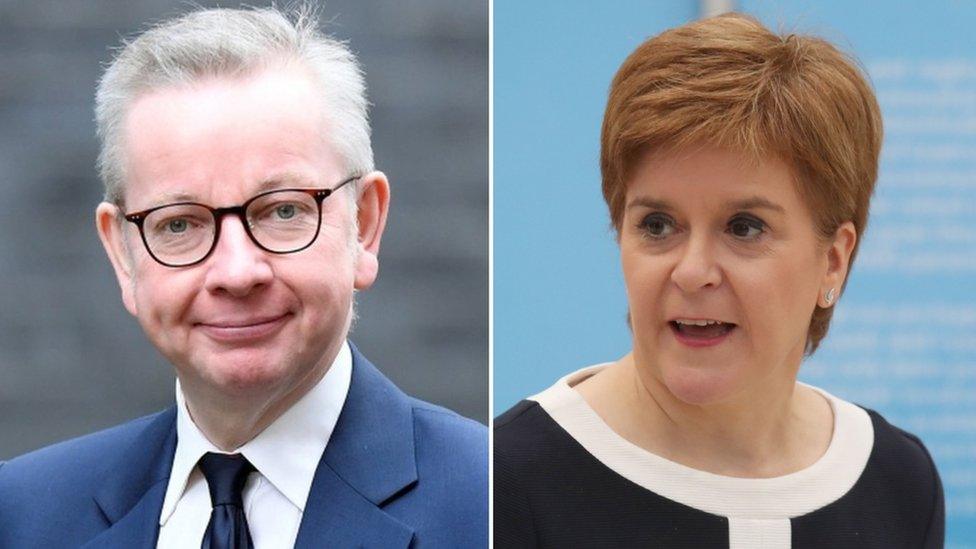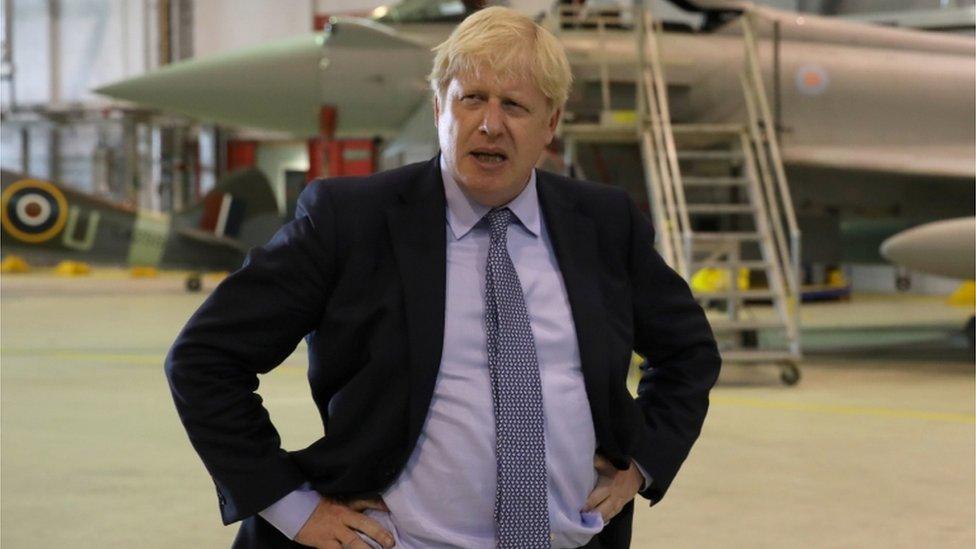Coronavirus: Ministers aim for UK-wide virus co-operation pledge
- Published
- comments

Nicola Sturgeon said she had suggested the joint statement, and welcomed Michael Gove's "positive" response to it
The UK and devolved governments are attempting to agree a joint approach to driving down coronavirus to the lowest possible levels and keeping it there.
Cabinet Office Minister Michael Gove said a joint statement would be released pledging to work together to defeat the virus.
He said it would also accept that the four nations of the UK would "move at their own pace".
Scottish First Minister Nicola Sturgeon said she had suggested the move.
Ms Sturgeon confirmed that work was now under way towards "exploring whether or not that is possible", and welcomed Mr Gove's "positive" comments about it.
She added: "What we have sought to look at is whether we can come to a joint approach that makes very clear that we are all trying to drive this virus to the lowest possible level, which I would call effective elimination, and keep it there.
"As opposed to having an approach that allows the virus to hover around at a certain level and then hope that it doesn't overwhelm you".
A Welsh Government spokesperson said: "While devolution has enabled governments across the UK to act according to our own unique circumstances and protect our people, we've always said that the UK effort to tackle the pandemic is best served by following a four-nation approach."
The attempt to secure a UK-wide position is likely to be seen as an attempt to defuse political tensions between the administrations.
Recent weeks have seen rows between the Scottish and UK governments over the amount of money that is being given to Holyrood to help tackle coronavirus.
The UK government has also dismissed calls for Scotland to be given more borrowing powers, while First Minister Nicola Sturgeon has refused to rule out imposing travel restrictions on people entering Scotland from the rest of the UK.
Meanwhile, Ms Sturgeon attacked a visit by Prime Minister Boris Johnson to Scotland last week as a political point-scoring exercise.
And opposition parties in Scotland have urged the BBC, external to stop broadcasting Ms Sturgeon's daily coronavirus briefings amid claims that they have effectively become "party political broadcasts" for the SNP.

The PM's visit to Scotland last week was seen by some as a response to an apparent rise in support for independence
Speaking to the BBC's Good Morning Scotland programme, Mr Gove said the UK government "respects the competence" of the Scottish, Welsh and Northern Ireland administrations.
He added: "We respect the fact that they do things differently, which suits the precise circumstances of Scotland, Wales and Northern Ireland, but we also recognise that we are stronger together.
"And when we work well together, we can use both the powers of the devolved administrations and the broad shoulders of the UK government to help everyone in Scotland."
Mr Gove, the UK government's cabinet office minister, said that Scotland is currently "guaranteed a higher per capita share of UK government expenditure" through the Barnett formula.
And he said the UK Treasury had specifically sought to help Scotland's tourism and hospitality sectors, which have been among the worst affected by the coronavirus lockdown.
He added: "The industry representatives who I talked to yesterday were appreciative of that support."

SOCIAL DISTANCING: What are the rules now?
HOLIDAYS: Will I get a summer break?

Opinion polls have suggested that more than half of voters in Scotland are currently in favour of independence.
But Mr Gove said the focus should be on helping everyone to recover from coronavirus rather than having a "stooshie" over the constitution.
And he said polls had also suggested that "independence and the constitution is way down the list of priorities for the Scottish people at the moment".
He added: "People want to concentrate on the NHS, they want to concentrate on the economy and on education."
Mr Gove also dismissed claims from the Scottish government that Holyrood powers are under threat by post-Brexit legislation.
'Additional powers'
Scotland, Wales and Northern Ireland are set to be handed powers in areas such as air quality and animal welfare that are currently regulated at EU level.
But in a bid to protect cross-border trade, they will have to recognise standards drawn up elsewhere in the UK.
Scottish Constitution Secretary Michael Russell has claimed that the proposals represented a "power grab" that would strip power from the Scottish Parliament.
He added that the plan would enable the UK government to "impose lower standards on Scotland" in its bid to sign trade deals around the world after Brexit.
But Mr Gove insisted: "The facts are that there will be additional powers which come to the Scottish Parliament and the Scottish government as a result of the end of the transition period.
"Mike (Russell) hasn't been able to point to a single power that is going from Holyrood to Westminster. It is quite the opposite."